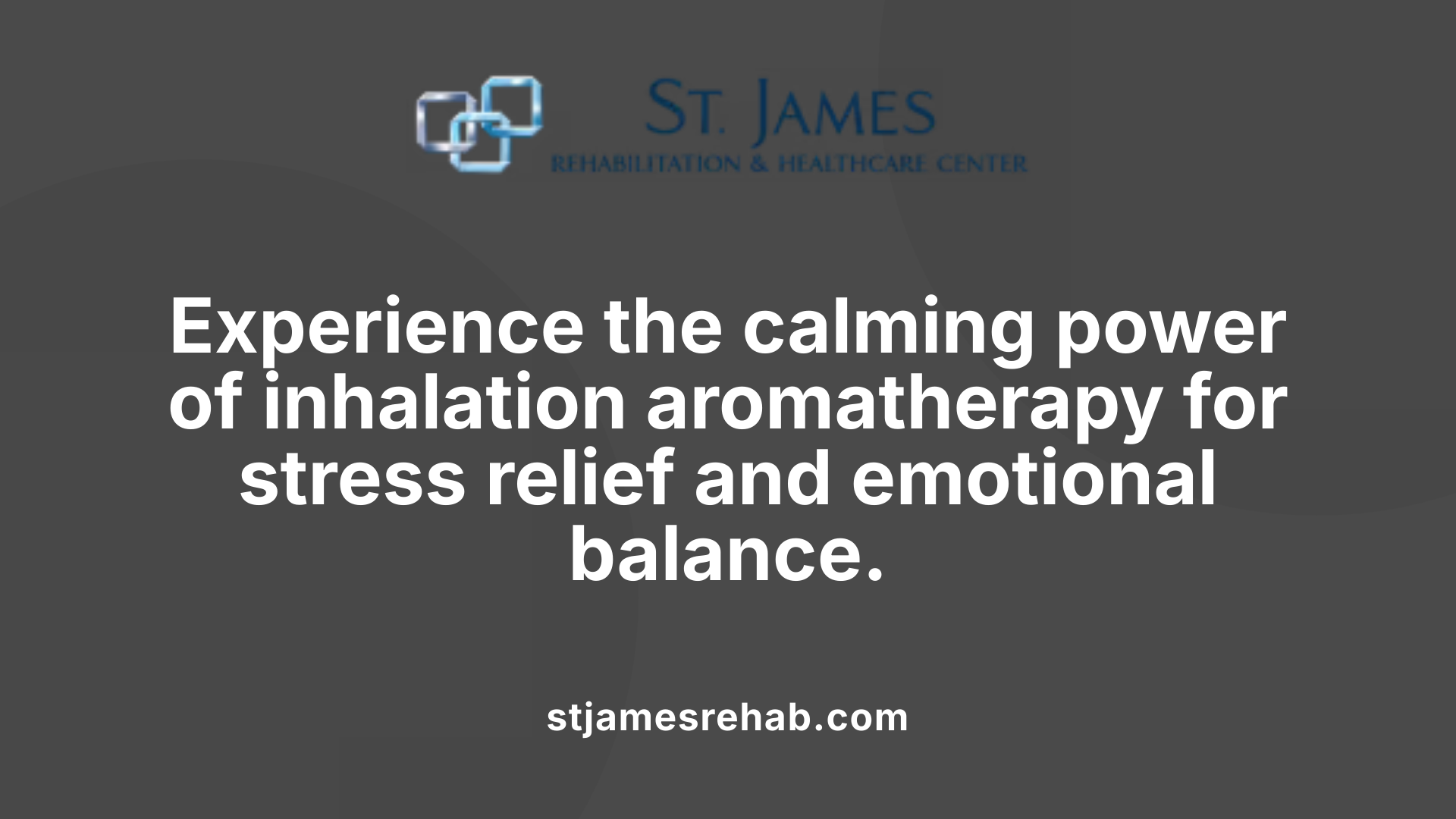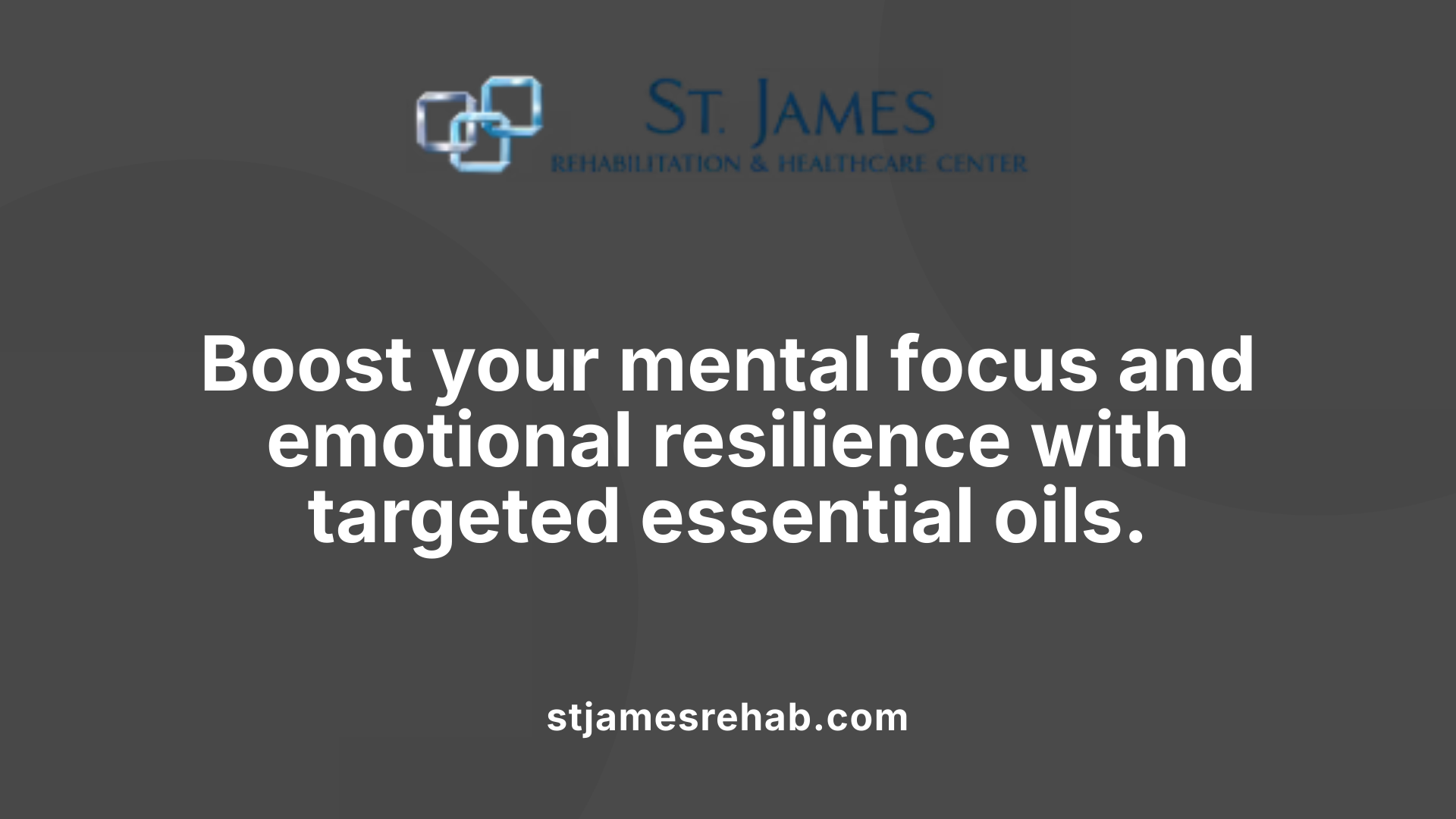The benefits of aromatherapy in stress reduction during rehab
Harnessing Aromatherapy for Emotional Balance in Rehabilitation

Exploring Natural Paths to Wellness During Recovery
Aromatherapy, an ancient practice utilizing plant extracts and essential oils, has gained recognition as a valuable complementary therapy in addiction recovery and rehabilitation settings. Its ability to promote relaxation, reduce stress, and support emotional stability makes it an effective tool for individuals navigating the challenges of detox, withdrawal, and physical rehabilitation. In this article, we explore the therapeutic benefits of aromatherapy, the science behind its effects, and practical methods to incorporate this natural therapy into recovery programs.
Understanding the Therapeutic Role of Aromatherapy in Rehab

How does aromatherapy promote physical and emotional wellbeing?
Aromatherapy uses the inhalation or topical application of essential oils derived from plants to enhance overall health. This practice stimulates receptors in the nose that send signals to the brain, particularly affecting the limbic system, which controls emotions and memory. Essential oils like lavender, chamomile, ylang-ylang, and citrus are celebrated for their calming and uplifting effects. They can reduce stress, promote relaxation, and improve sleep quality, making them beneficial during recovery from substance use disorder (SUD). Additionally, oils such as ginger and peppermint help alleviate physical discomforts like digestive issues and muscle pain, supporting physical recovery.
Beyond calming effects, aromatherapy can foster mental clarity and focus. Oils like sage, rosemary, and cedarwood are known to sharpen concentration and promote mindfulness. This combination of physical and emotional benefits helps stabilize mood, reduces anxiety, and creates a soothing environment conducive to healing.
How do essential oils interact with the brain's mood centers?
Essential oils influence the brain’s limbic system—the center for emotions and behavior—through their scent receptors. When inhaled, these oils send signals directly to this system, which then triggers the release of mood-regulating hormones such as serotonin, dopamine, and endorphins.
Research indicates that certain oils, including bergamot, lavender, and citrus, positively impact psychological well-being by activating these neural pathways. For example, bergamot oil has been linked to reduced anxiety and improved emotional balance, while lavender promotes sleep and stress relief. The interaction with brain centers not only alleviates emotional distress but also enhances mental clarity, which is often compromised during withdrawal or post-acute withdrawal syndrome (PAWS).
How does aromatherapy support emotional stability and physical relaxation?
Aromatherapy fosters emotional stability by reducing feelings of anxiety and depression. The calming effects of oils like lavender, chamomile, and sandalwood help soothe the nervous system, promoting a sense of calmness and mindfulness.
Physically, these essential oils can decrease muscle tension, relieve headaches, and reduce joint pain—common discomforts experienced during recovery. For instance, rosemary and chamomile oils are used to ease muscle and headache pains, while peppermint and ginger help with nausea and digestive discomfort.
In practical terms, aromatherapy techniques such as diffusion, massage, or baths allow different ways to incorporate these oils safely. Proper use, including dilution and patch testing, ensures effectiveness while minimizing adverse reactions. When integrated into holistic treatment plans, aromatherapy actively supports emotional and physical health, contributing to a more comfortable and balanced healing journey.
Inhalation Aromatherapy and Its Impact on Stress Reduction

How does inhalation aromatherapy help reduce stress and support recovery?
Inhalation aromatherapy aids in reducing stress and enhances recovery by engaging the brain’s limbic system—the part responsible for emotions, memories, and mood regulation. When essential oils like lavender, bergamot, or cedarwood are diffused into the air or inhaled directly, their molecules travel through the olfactory system and communicate with brain receptors. This interaction triggers the release of feel-good chemicals such as serotonin, endorphins, and dopamine, which promote feelings of calmness and well-being.
Scientific evidence supports the effectiveness of inhalation methods. A comprehensive review of 76 clinical trials involving over 6,500 patients from 2000 to 2021 found that approximately 70% of these studies reported significant reductions in stress and anxiety after inhaling essential oils. The most studied oils—lavender, rose, and orange—are frequently used in clinical settings to alleviate procedural anxiety and general stress.
Mechanisms of inhalation aromatherapy in stress management
The essential oils’ volatile compounds, such as linalool in lavender or citronellol in rose, interact with receptors in the olfactory bulb, which directly impacts the limbic system of the brain. This system plays a critical role in emotional regulation and neurochemical responses. Activation of this pathway leads to a decrease in stress hormones like cortisol and can stabilize vital signs such as heart rate and blood pressure.
Furthermore, inhalation can influence the hypothalamic-pituitary-adrenal (HPA) axis, which governs the body’s response to stress. By modulating this system, aromatherapy can help calm hyperactive stress responses, effectively supporting people during detoxification, withdrawal, or stressful transitions in recovery programs.
Scientific evidence supporting inhalation methods
Research from the National Center for Biotechnology Information highlights the consistent positive effects of inhalation aromatherapy on psychological and physiological stress markers. Multiple RCTs demonstrate improvements in vital signs, reductions in salivary cortisol levels, and decreased self-reported stress scores.
A meta-analysis further consolidates these findings, emphasizing that inhalation aromatherapy is a safe, cost-effective approach with minimal adverse effects. It is increasingly incorporated into clinical environments such as hospitals and rehabilitation centers to promote relaxation and emotional stability.
Physiological and neurochemical pathways affected
Aromatherapy inhalation influences several physiological pathways. It stimulates the limbic system, which regulates emotional responses and neuroendocrine functions. This stimulation results in the secretion of neurotransmitters that promote relaxation.
Additionally, the compounds in essential oils affect the autonomic nervous system, balancing sympathetic and parasympathetic activity. This balance reduces anxiety, lowers blood pressure, and normalizes heart rate.
Table 1: Summary of Common Essential Oils and Their Stress-Relief Actions
| Essential Oil | Main Components | Effects | Usage Recommendations |
|---|---|---|---|
| Lavender | Linalool, linalyl acetate | Calming, sleep induction | Diffuse or inhalation |
| Rose | Geraniol, phenylethyl alcohol | Mood lifting, anxiety reduction | Diffuse or direct inhalation |
| Cedarwood | Cedrol, alpha-cedrene | Relaxation, stress relief | Diffuse or massaged mixed with carrier oils |
In conclusion, inhalation aromatherapy employs the transfer of aromatic molecules to the brain’s emotional centers, offering a natural way to boost emotional resilience and manage stress during recovery.
Essential Oils That Promote Mental Clarity and Emotional Stability

What are the main essential oils supporting mental wellness?
Aromatherapy incorporates several essential oils known for their ability to support mental clarity and emotional balance. Oils such as lavender, bergamot, sandalwood, rosemary, peppermint, and citrus oils are frequently used for mental and emotional benefits.
Lavender and chamomile oils are celebrated for their calming effects, helping reduce anxiety and promote restful sleep. Bergamot and ylang-ylang are uplifting and mood-enhancing, often used to elevate feelings of well-being. Rosemary and peppermint, on the other hand, are recognized for their ability to sharpen concentration and focus, which is especially useful during phases of recovery when mental clarity might be compromised.
How do essential oils influence emotional regulation?
Essential oils affect emotions through their interaction with receptors in the olfactory system. When inhaled, volatile compounds from oils activate the limbic system—the brain's center for emotions and memory. This interaction can influence emotional regulation by triggering the release of mood-boosting neurotransmitters like serotonin and dopamine.
For example, lavender and ylang-ylang promote relaxation, reducing stress and anxiety, while citrus oils like orange and lemon can uplift spirits and foster a sense of happiness. Sandalwood and cedarwood are also used for their meditative qualities, helping individuals attain mindfulness and emotional stability.
What is the scientific basis behind essential oils affecting brain functions?
Research supports that inhalation of essential oils impacts brain activity by stimulating the limbic system. Studies, including numerous randomized controlled trials, have shown that inhalation aromatherapy can significantly decrease stress and anxiety—highlighted by reductions in physiological markers such as cortisol levels.
The neurochemical pathways involved include the activation of smell receptors leading to the hypothalamus and limbic system, which modulate emotional responses and hormonal releases. For instance, bergamot oil has been shown to positively affect psychological well-being, while lavender is linked to improved sleep quality and reduced anxiety. Additionally, some oils, like rosemary and ginger, can enhance mental clarity by improving circulation and stimulating neural activity.
| Essential Oil | Primary Benefits | How It Affects Brain Function |
|---|---|---|
| Lavender | Calming, sleep support | Promotes relaxation, reduces stress |
| Bergamot | Uplifting mood | Enhances emotional well-being |
| Sandalwood | Focus, meditation | Deepens mindfulness, calm |
| Rosemary | Concentration, mental clarity | Boosts cognitive abilities |
| Peppermint | Alertness | Stimulates neural activity |
Incorporating these oils through diffusion, massage, or inhalation can be a valuable adjunct in addiction recovery, helping foster emotional resilience, reduce hurdles like anxiety, and support overall mental health.
Aromatherapy for Stress Relief: The Most Effective Essential Oils

Which essential oils are most effective for stress relief?
The most effective essential oils for easing stress and anxiety include lavender, chamomile, bergamot, cedarwood, ylang-ylang, and clary sage. Lavender stands out as particularly popular, renowned for its calming properties that can help reduce feelings of stress, anxiety, and even improve sleep. Bergamot and cedarwood oils have also shown promising results in lowering anxiety levels and uplifting mood. Chamomile is valued for its soothing effects, which can help alleviate symptoms of depression and promote relaxation.
In addition to their traditional uses, scientific studies support the effectiveness of these oils in managing emotional stress. For example, inhalation of lavender and bergamot oils has been linked with decreased cortisol levels and improved psychological well-being. Mixing these oils into diffusers, applying diluted blends during massages, or adding them to baths can enhance mental calmness.
Research and traditional uses supporting these oils
The therapeutic benefits of these essential oils stem from their ability to activate receptors in the olfactory system that communicate with emotional centers in the brain, such as the limbic system. Modern studies have documented positive effects, with approximately 70% of clinical trials reporting reduced stress and anxiety when using inhalation aromatherapy.
Historically, these oils have been employed in various cultures for their calming, mood-enhancing, and sleep-promoting properties. The combination of scientific research and traditional use underscores their role in holistic stress reduction practices.
Safe usage and precautions
While these oils are generally safe, proper handling is crucial. It is recommended to dilute essential oils with carrier oils when applying to skin to prevent irritation. Those with respiratory conditions or allergies should conduct a patch test and consult healthcare professionals before use.
Inhalation via diffusers or direct scent exposure is an effective way to experience their benefits with minimal risk. Avoid ingestion of essential oils unless supervised by a qualified healthcare provider. Reactions like skin or eye irritation and allergic responses can occur if safety precautions are neglected.
Overall, integrating these essential oils into daily routines—via diffusion, massage, or baths—and employing stress management techniques can provide significant relief from anxiety and promote emotional stability.
Integrating Aromatherapy into Holistic Recovery Strategies
Incorporating aromatherapy into comprehensive rehab programs offers a gentle yet effective approach to managing stress, easing withdrawal symptoms, and promoting emotional well-being. Its ability to engage the brain’s limbic system through inhalation or topical application helps foster relaxation, enhance mood, and improve sleep — all critical elements for successful recovery. When used under professional guidance, aromatherapy can complement traditional therapies, providing a natural avenue to support emotional resilience and reduce the risk of relapse. As scientific research continues to explore its mechanisms and benefits, aromatherapy remains a promising, accessible, and cost-effective adjunct for nurturing mental health and physical recovery during rehabilitation.
References
- Benefits of Aromatherapy in Addiction Recovery
- Benefits of Aromatherapy for Addiction Recovery
- Benefits of Aromatherapy in Addiction Recovery: Essential Oils as ...
- Clinical Aromatherapy in Physical Medicine and Rehabilitation
- Benefit of inhalation aromatherapy as a complementary treatment for ...
- The Benefits of Aromatherapy and Essential Oils for Relaxation and ...
- Benefits of Aromatherapy in Addiction Recovery
- Aromatherapy Information | Mount Sinai - New York





